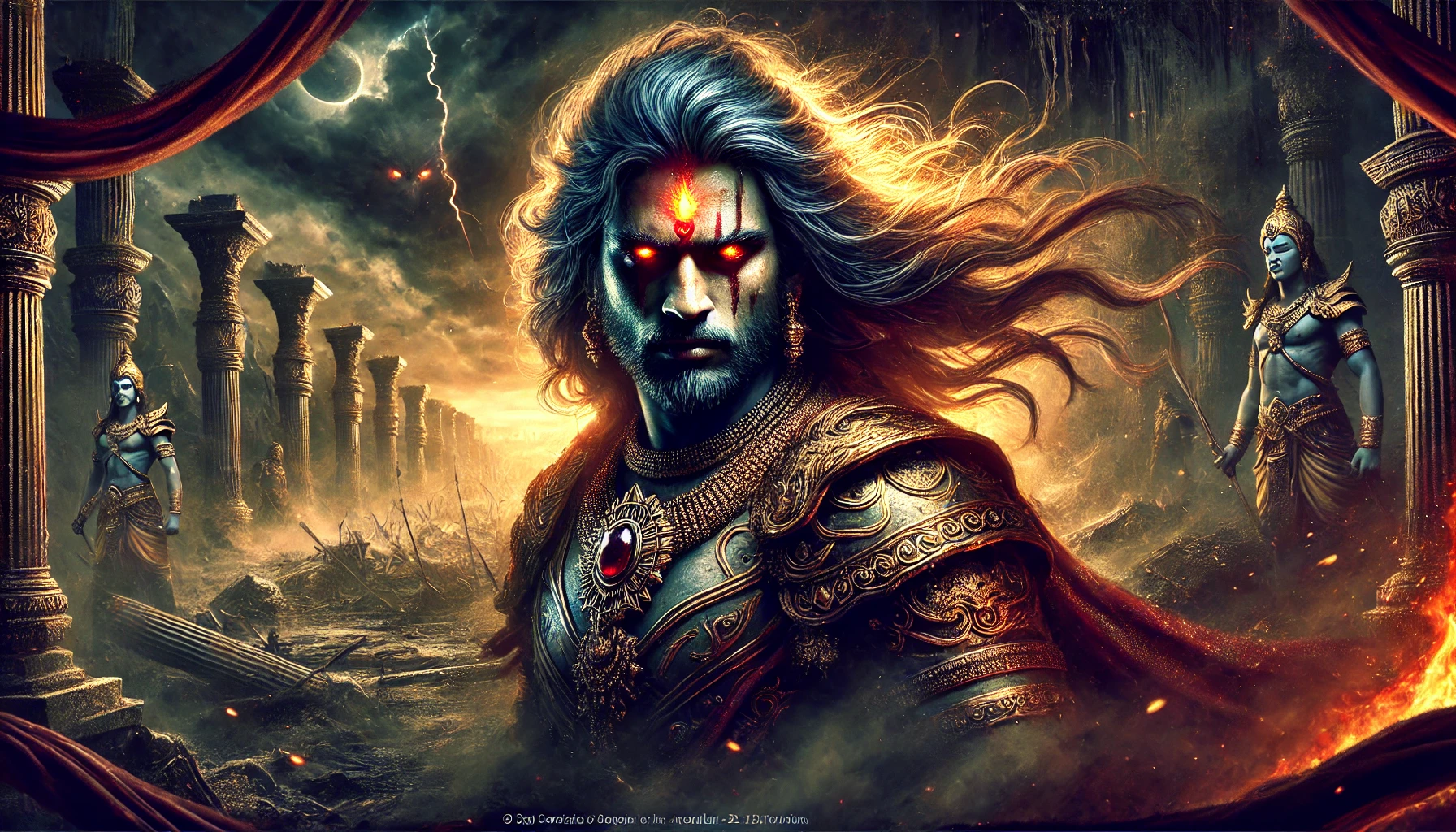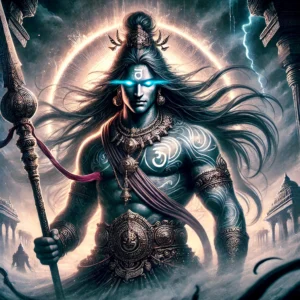
Ashwatthama the Immortal warrior story
Ashwatthama: The Immortal Warrior of Sanatan Dharma
Ashwatthama, one of the most enigmatic and tragic characters in Indian mythology, is a fascinating blend of unparalleled power, divine blessings, and a cursed destiny. Known as one of the seven Chiranjivi (immortals), his story from the Mahabharata serves as a powerful narrative about the responsibilities of power, the consequences of actions, and the cyclical nature of karma.
Birth and Divine Origins
Ashwatthama, the son of Guru Dronacharya and Kripi, was born as a boon from Lord Shiva. His birth was accompanied by divine signs, and he carried a celestial jewel (Mani) in his forehead that made him immune to hunger, thirst, disease, and mortal weapons. This jewel radiated power and aura, protecting him from all harm and symbolizing his destiny as a divine yet complex warrior.
Ashwatthama’s very name signifies his divine connection: it means “one who has the strength of a horse.” This name originated from his unusual birth cry, which resembled the neigh of a horse.
Table of Contents
The Making of a Warrior
From an early age, Ashwatthama was trained by his father, Dronacharya, the greatest martial teacher of his time. Under his tutelage, Ashwatthama mastered:
Archery and Warfare:
Ashwatthama was an unrivaled archer who could rival even Arjuna in skill and precision.
Divine Weapons:
Ashwatthama had mastery over Brahmastra, the deadliest weapon of destruction, along with other celestial weapons like the Narayanastra and Agnastra.
Physical and Mental Strength:
Ashwatthama was not only physically indomitable but also possessed sharp intellect, making him a formidable strategist in battle.
Immortality as a Boon:
His divine jewel and immortality ensured that he was a warrior who could not be defeated in the conventional sense.
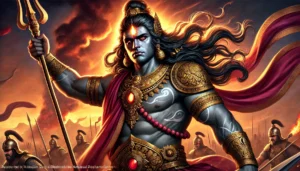
Ashwatthama the Immortal warrior story
Ashwatthama in the Mahabharata
Ashwatthama’s role in the Mahabharata is one of courage, loyalty, and moral conflict. Despite his immense power, his actions are often marred by impulsive decisions and vengeance, leading to his tragic downfall.
Early Role in the War
During the Kurukshetra war, Ashwatthama played a key role on the side of the Kauravas. He was a loyal friend to Duryodhana and stood by him even when his father, Guru Dronacharya, tried to remain neutral.
Loyalty and Bravery: Ashwatthama’s fierce loyalty made him a terror on the battlefield. His unmatched fighting skills resulted in the destruction of countless Pandava warriors.
A Moral Dilemma: Despite his loyalty, Ashwatthama often faced moral dilemmas, especially regarding the use of destructive divine weapons like the Brahmastra.
The Death of Dronacharya
The turning point in Ashwatthama’s life came with the death of his father. Deceived by the Pandavas, Dronacharya was killed while meditating in grief over a false report of his son’s death. This event filled Ashwatthama with uncontrollable rage and a desire for vengeance.
The Night of Revenge
In a moment of fury and despair, Ashwatthama unleashed his wrath upon the Pandava camp during the night, a time traditionally considered sacred and unsuitable for war. Using the Narayanastra and his military skills, he slaughtered many warriors, including the five sons of Draupadi (the Upapandavas) while they slept.
This act, considered a grave violation of the warrior code (Kshatriya Dharma), turned Ashwatthama from a valiant hero into a tragic anti-hero.
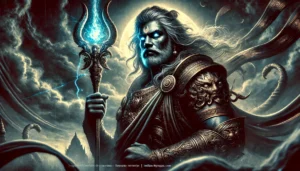
Ashwatthama the Immortal warrior story
The Brahmastra Incident
In his final confrontation with Arjuna, Ashwatthama invoked the Brahmastra, a divine weapon of mass destruction. Arjuna countered with another Brahmastra, leading to a potential cataclysm. It was only through Lord Krishna’s intervention that the two weapons were neutralized.
As a punishment for misusing the Brahmastra and his earlier atrocities, Krishna cursed Ashwatthama to wander the Earth, immortal but in perpetual suffering, stripped of his divine jewel.
Ashwatthama’s Immortality
Ashwatthama’s curse condemned him to roam the Earth for eternity, enduring pain, loneliness, and the weight of his guilt. Legends suggest he is still alive, his immortal body bearing the marks of his cursed life.
Legends and Sightings:
Folklore mentions sightings of Ashwatthama in ancient temples and forests, often described as a towering figure with an unhealed wound on his forehead.
Symbolism of Immortality:
Ashwatthama’s immortality serves as a reminder that power without responsibility leads to self-destruction, and actions driven by anger have eternal consequences.
Ashwatthama’s Powers and Legacy
Ashwatthama’s power was immense, rivaling even the greatest warriors of his time. However, his impulsiveness and desire for vengeance overshadowed his abilities. His legacy offers profound lessons:
Unchecked Power Can Destroy:
Despite his divine gifts, Ashwatthama’s inability to control his emotions led to his downfall.
The Eternal Law of Karma:
His life exemplifies how actions, good or bad, have far-reaching consequences.
The Complexity of Dharma:
Ashwatthama’s story highlights the moral complexities of Dharma, where even the mightiest can fall prey to the consequences of Adharma.
Relevance in Modern Times
Ashwatthama’s story resonates deeply with modern challenges, symbolizing the need for balance, ethical decision-making, and the consequences of unchecked power. His tale serves as a reminder of the eternal truths of Sanatan Dharma and the enduring relevance of its teachings.
For in-depth explorations of the legends, philosophies, and spiritual wisdom of Sanatan Dharma, visit Prachin Sanatan Yuga. Explore the timeless stories that continue to inspire and guide humanity.
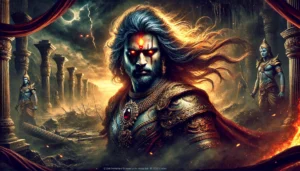
Ashwatthama the Immortal warrior story
FAQs on “Ashwatthama the Immortal: The Power, Curse, and Legacy of a Legendary Warrior”
- Who is Ashwatthama?
Ashwatthama is a significant figure in the Mahabharata, known as the son of Guru Dronacharya and Kripi. Born with the blessings of Lord Shiva, Ashwatthama inherited exceptional warrior skills and played a crucial role in the Kurukshetra war. His life is marked by valor, tragedy, and controversy, making him one of the most enigmatic characters in Indian mythology.
- Why is Ashwatthama called immortal?
Ashwatthama is considered one of the Chiranjivis (immortals) in Hindu mythology. After his misdeeds during and after the Mahabharata war, Lord Krishna cursed him to wander the Earth in pain, with no relief from his suffering. This curse granted him immortality but condemned him to a life of isolation and misery.
- How powerful was Ashwatthama?
Ashwatthama was a warrior of extraordinary prowess, trained in military arts and celestial weaponry by his father, Dronacharya. He was skilled in using divine weapons such as the Brahmastra, which could cause mass destruction. His strength was amplified by the divine gem (Mani) embedded in his forehead, which made him invincible against diseases and mortal wounds.
- What was the curse given to Ashwatthama?
Ashwatthama was cursed by Lord Krishna for his unethical use of the Brahmastra against the unborn child of Uttara, the wife of Abhimanyu. Krishna’s curse rendered him immortal but stripped him of his Mani, leaving him vulnerable to ailments and eternal suffering. He was destined to roam the Earth alone, shunned by humanity, as a symbol of the consequences of adharma (unrighteousness).
- What was Ashwatthama’s role in the Mahabharata war?
Ashwatthama fought on the Kaurava side and was instrumental in various battles. Notable among his acts was his involvement in the slaying of the Pandava ally Drupada and his relentless pursuit of the Pandavas. After the war, he infamously led a night raid on the Pandava camp, killing the sons of the Pandavas in their sleep, a deed that sealed his fate.
- Why did Ashwatthama unleash the Brahmastra?
Overcome by rage and grief after the death of his father, Dronacharya, Ashwatthama sought vengeance against the Pandavas. He unleashed the Brahmastra, a weapon of immense destruction, to annihilate the Pandava lineage. However, the act was condemned as unrighteous, as it endangered innocent lives and violated the codes of war.
- What is the significance of Ashwatthama’s divine gem (Mani)?
The Mani on Ashwatthama’s forehead was a divine blessing that granted him immunity from diseases, hunger, and fatigue, and also enhanced his strength. However, Krishna removed the Mani as part of the curse, leaving him exposed to mortal weaknesses and eternal suffering.
- What lessons can be learned from Ashwatthama’s story?
Ashwatthama’s tale highlights the destructive power of anger, pride, and vengeance. His downfall underscores the importance of adhering to dharma (righteousness) and the consequences of unethical actions, no matter how justified they may seem in the moment.
- Where is Ashwatthama believed to be now?
According to legends, Ashwatthama continues to wander the Earth, bearing the burden of his curse. Folklore suggests he roams in remote forests or sacred places, leading a life of solitude and penance. Some believe that occasional sightings of an ancient, wounded man could be Ashwatthama.
- Does Ashwatthama have any spiritual significance?
While not typically worshipped, Ashwatthama is a figure of intrigue in Sanatan Dharma. His story serves as a moral and spiritual reminder about the weight of one’s actions and the importance of following the path of righteousness, even during times of adversity.
- Why didn’t Krishna forgive Ashwatthama?
Krishna’s curse to Ashwatthama was not out of vengeance but to uphold dharma. By punishing him, Krishna ensured that Ashwatthama’s deeds would serve as a warning for future generations about the consequences of straying from the path of righteousness.
- Can Ashwatthama be redeemed?
The possibility of Ashwatthama’s redemption is a topic of philosophical debate. Some believe that through intense penance and spiritual awakening, even the cursed can find peace. Others suggest that his fate is eternal, serving as a living example of the consequences of moral transgressions.
- How does Ashwatthama’s story relate to modern times?
Ashwatthama’s life teaches timeless lessons about the destructive nature of unchecked emotions like anger and revenge. His immortality and suffering can be interpreted as symbolic of the eternal burden of guilt and the consequences of moral failure, a theme that resonates across cultures and eras.
Summary
Ashwatthama, one of the most enigmatic characters from the Mahabharata, is renowned for his unmatched prowess and the curse that doomed him to immortality. Born as the son of Dronacharya and blessed by Lord Shiva, Ashwatthama was a formidable warrior with immense strength, strategic brilliance, and mastery over celestial weapons. His loyalty to the Kauravas and his role in the Kurukshetra War showcase his complex personality, marked by both valor and vengeance.
However, his impulsive actions during the war, including the night slaughter of the Pandava camp and the misuse of the Brahmastra weapon, led to a devastating curse by Lord Krishna. This curse condemned him to roam the earth eternally, suffering from unhealed wounds and rejection, as a reminder of his deeds.
The story of Ashwatthama reflects the intricate interplay of power, morality, and destiny in Sanatan Dharma, leaving us to ponder the consequences of unchecked ambition and the burden of immortality. Through his tale, we explore the limits of human strength and the profound impact of divine justice.
Related Articles
- Restful Nights: Ayurvedic Remedies and Traditional Indian Practices to Overcome Insomnia and Late-Night Habits
- The Tridevi: Lakshmi, Saraswati, and Parvati – Their Roles and Powers
- “Divine Creatures of Ancient Indian Scriptures: Exploring the Role of Animals in the Vedas, Puranas, and Mahabharata”
- Nature and Spirituality: Exploring the Sacred Essence of the Himalayas, Ganga, and Other Natural Wonders”
- “Reviving the Gurukul System: Relevance and Lessons for Modern Education”
- “Exploring Greek and Indian Mythology: Similarities Between Greek and Indian Mythology “
- “Embracing Sattvic Living: Harmonizing Mind, Body, and Soul Through Food and Lifestyle”
- “Charity and Prosperity: Exploring the Concept of Daan and Its Financial Relevance in Modern Life”
- How to Build an Eco-Friendly Home Inspired by Vastu Shastra
- Comparison of Ancient and Modern Sports: How Traditional Sports Have Influenced Contemporary Games
- “Timeless Lessons from Ancient Tales: Linking Samudra Manthan and Ganga’s Descent to Modern Ecological Challenges”
- “Reviving Sanskrit: How AI is Preserving Ancient Languages for the Future”
- “Mathura: The Sacred Land of Lord Krishna’s Divine Leelas”
- Investing for Future Generations: Lessons from Indian Traditions on Legacy Building and Wealth Preservation
- “Ancient Indian Wisdom: Timeless Lessons for Tackling Today’s Climate Crisis”
- “Artificial Intelligence and Spirituality: Transforming Ancient Practices for the Modern World”
- “Gold and Real Estate in India: Timeless Assets Shaping Financial Strategies”
- Tradition Meets Innovation: The Evolution of Technology in Hindu Rituals
- End-of-World Myths: Exploring Kali Yuga in Hinduism and Ragnarök in Norse Mythology
- Garuda, Pegasus, and Dragons: The Universal Ties of Mythical Beasts Across Cultures
- “Ancient Vimanas: Mythical Flying Machines or Evidence of Advanced Technology?”
- Time Travel in Hindu Mythology: The Fascinating Tales of Kakudmi and King Raivata
- “Divine Feminine Power in Hindu Mythology: The Legends of Durga, Saraswati, and Lakshmi”
- “Divine Beings of Sanatan Dharma: The Spiritual Significance of Sacred Animals in Hinduism”
- “Symbolism in Mythological Art: Unlocking Hidden Meanings in Ancient Temple Carvings”
- “Exploring Technological Advancements in Ancient India and Civilizations: Vimana, Metallurgy, & Water Management systems”
- Unveiling the Mysteries: Ancient Temples of Sanatan Dharma , Mysterious Temples of India
- “The Scientific Knowledge of Sanatan Dharma: Ancient Wisdom Meets Modern Science”
- Ancient Indian Sports and Games: Celebrating a Legacy of Skill, Strength & Strategy”
- “Exploring the Cosmic Link: The Connection Between Astronomy and Vedic Astrology”
- The Power of Sanskrit: Unlocking the Divine Language of the Gods
- “The End of Kaliyuga: A Sanatan Insight into the World’s Final Chapter”
- Explore more articles on Prachin Sanatan Yuga.
Ashwatthama, a significant character in the Indian epic Mahabharata, was the son of Guru Dronacharya and one of the eleven warriors on the Kaurava side. Known for his exceptional warrior skills and immortality granted by Lord Shiva, Ashwatthama played a crucial role in the Kurukshetra War.
Toward the end of the war, after the death of his father, Dronacharya, Ashwatthama became filled with rage and vowed to destroy the Pandavas. In a controversial move, he used a celestial weapon, the Narayanastra, but was advised against using it excessively.
The most notable and tragic episode involving Ashwatthama occurred during the night after the war. He infiltrated the Pandava camp and, mistaking the Pandava brothers for their sons, killed the five Upapandavas (sons of the Pandavas) in their sleep. This act was seen as a violation of the warrior code and deeply condemned.
As a consequence, Lord Krishna cursed Ashwatthama with an eternal, wandering life of suffering and isolation. His immortality became a curse, forcing him to roam the earth in agony, bearing a wound on his forehead that would never heal.
Ashwatthama’s story is a profound tale of valor, vengeance, and the devastating consequences of unchecked anger and moral transgressions.
Ashwatthama the Immortal warrior story Ashwatthama the Immortal warrior story Ashwatthama the Immortal warrior story Ashwatthama the Immortal warrior story Ashwatthama the Immortal warrior story Ashwatthama the Immortal warrior story
Ashwatthama’s story is a profound tale of valor, vengeance, and the devastating consequences of unchecked anger and moral transgressions.
As a consequence, Lord Krishna cursed Ashwatthama with an eternal, wandering life of suffering and isolation. His immortality became a curse, forcing him to roam the earth in agony, bearing a wound on his forehead that would never heal.
Ashwatthama the Immortal warrior

